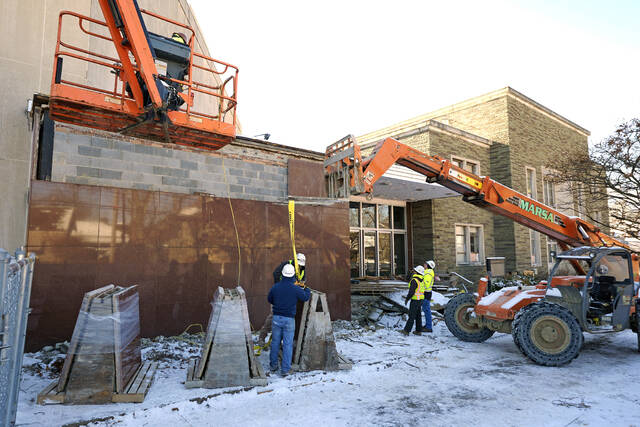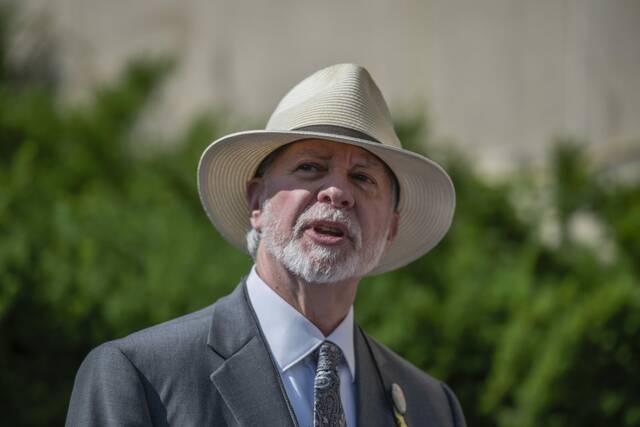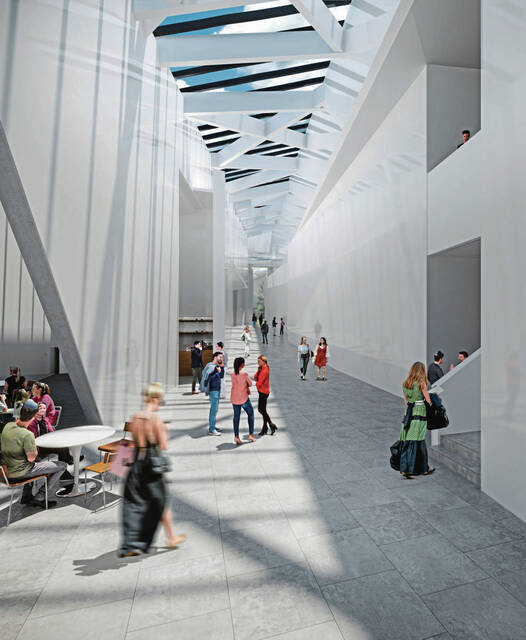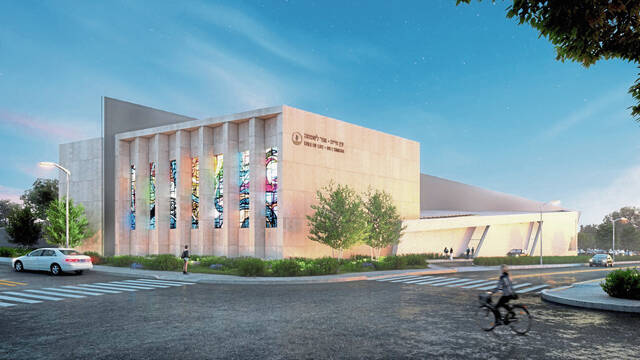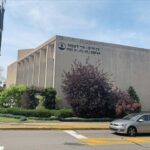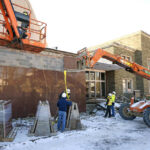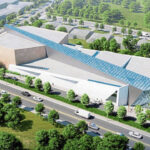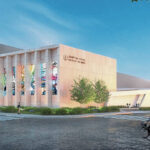Audrey Glickman learned about antisemitism at a young age.
In the second grade, the third-generation Pittsburgher started walking to B’nai Emunoh, an Orthodox shul a few blocks away in Greenfield’s working-class business district.
She studied there for several years, until her bat mitzvah, the Jewish rite of passage into adulthood, on Jan. 2, 1970.
“Every week, we’d learn about another person who tried to kill the Jews,” said Glickman, 67, a mother of two who’s worked as a legal secretary, a rabbi’s assistant and chief of staff to former Pittsburgh Councilwoman Darlene Harris. “There’s plenty of positive history about Jewish people. But we learned who would be the next person to do something bad to the Jews.”
“It taught us that this is going to happen every generation,” she said. “But you’ve got to make the most of it. You’ve got to live through it and make peace.”
Glickman — standing near a dozen Echinacea flowers, pinkish-purple and daisy-like, that are blooming in her front yard — said she sometimes grapples with the notion: She’s now part of that history lesson.
Sunday will mark 2,066 days since Glickman and her partner, Joe Charny, fled Pervin Chapel after a gunman broke into the Tree of Life synagogue on Oct. 27, 2018. He killed 11 Jews from three congregations that worshipped there: Tree of Life-Or L’Simcha, which since has eliminated the second half of its name; New Light; and Dor Hadash.
The couple survived by huddling near a choir loft under prayer shawls, disguised among bags of clothing set for donation.
On Sunday, at an invitation-only groundbreaking ceremony for the new Tree of Life campus in Squirrel Hill, Glickman will blow the shofar — a ram’s-horn trumpet used by ancient Jews in religious ceremonies. Then, she’ll wade deeper into that history, balancing the lessons she’s learned about antisemitism with the drive to remain positive in its aftermath.
Douglas Emhoff, the husband of Vice President Kamala Harris, is set to speak at the ceremony. So is Pennsylvania Gov. Josh Shapiro.
Members of the Pittsburgh Symphony Orchestra plan to perform, event organizers said. CNN’s Wolf Blitzer, the son of Holocaust survivors, is serving as emcee.
“It’s up in the air, what Sunday means to the congregation itself,” Glickman told TribLive. “We’re entering something where we don’t know where we’ll go. But we’re cohesive and we’re going to remain cohesive. It’s an adventure. It’s all an adventure.”
Rebuilding
Sunday’s groundbreaking ceremony starts another chapter for the Tree of Life synagogue, which celebrates its 160th anniversary on Wednesday.
It is another step in a yearslong healing process for those who survived the shooting or are wading through its wake. For them, their rabbi said, there’s no such thing as closure.
Administrators in charge of the synagogue have kept their eyes fixed forward.
Demolition of the building, which sat for 72 years at the corner of Shady and Wilkins avenues, started Jan. 17.
Construction is set to begin on the new, 45,000-square-foot Tree of Life building, designed by the studio of renowned Polish-American architect Daniel Libeskind, in collaboration with Rothschild Doyno Collaborative of Pittsburgh. Libeskind, the Jewish son of Holocaust survivors, is best known for designing the Jewish Museum Berlin in Germany and working on what replaced the World Trade Center after the 9/11 attacks.
The new structure will provide worship space for the Tree of Life congregation, an education and research center, and the nation’s first museum that focuses on American antisemitism.
It also will include a memorial to the 11 Jews killed during a Shabbat, or sabbath, service in 2018, in what remains the largest antisemitic attack in U.S. history.
Rabbi Jeffrey Myers, like the congregation he’s served since July 31, 2017, has displayed a steely resolve through the years following Oct. 27, 2018.
The New Jersey native has taken part in efforts to rebuild and memorialize.
He’s led religious services in a temporary space at a synagogue in a different neighborhood.
He’s appeared frequently in public — and not just on the news.
In May 2023, Myers testified in the synagogue shooter’s much-anticipated federal trial, recounting the morning of the shooting. He recalled gripping a bathroom doorknob in his right hand for 40 minutes while holding a cellphone to his ear with his left.
Facing death, he quietly prayed.
“I expected to die,” Myers testified. “I thought about the history of my people, how we’ve been hunted and persecuted and slaughtered, and thought about the moments before their death.”
Myers is not alone in mourning the victims: Rose Mallinger, 97; Bernice Simon, 84, and her husband, Sylvan Simon, 86; brothers David Rosenthal, 54, and Cecil Rosenthal, 59; Dan Stein, 71; Dr. Jerry Rabinowitz, 66; Joyce Fienberg, 75; Melvin Wax, 87; Irving Younger, 69; and Richard Gottfried, 65.
His congregants expressed complicated feelings when the shooter, whose name most will not repeat, was sentenced to death. Guilty on all 63 federal counts, the Baldwin man remains on death row in an Indiana penitentiary.
Despite these experiences, though, Myers said he continues to have no fixed notions about what events like the one approaching on Sunday will bring.
“I like to think that I’m open to all the potential this day offers — personally, for the congregation, for the Jewish community, for Pittsburgh and for the world,” Myers said. “I think it’s a really powerful statement to the entire world that we didn’t let evil chase us from our home.”
Some congregants said the building itself is — and will continue to be — loaded with meaning, especially after attending services for nearly six years in a “temporary” set-up at the Rodef Shalom synagogue in Shadyside.
The synagogue’s original beige, limestone edifice is being incorporated into the new building’s design.
“The ability to say, ‘We’re home,’ that’s a huge part of the healing process,” said Alan Hausman, 64, of Squirrel Hill, who’s in the final year of his three-year term as synagogue president. “No matter how great your dorm room is at college, it’s not home.”
The shadows of the day of the attack have not faded.
“Oct. 27 is on my mind every single day; I live with it every day,” Myers said. “But I’m not going to be addressing that Sunday because Sunday is not about that. Sunday is about reflection and the bittersweet marking of the next chapter.”
A growing threat
The Tree of Life synagogue has long illustrated Jewish trends — and reflected Jewish history — in Pittsburgh, historians say.
Founded on June 26, 1864, in Downtown Pittsburgh, the congregation’s beginnings were modest, according to Eric Lidji, director of the Rauh Jewish History Program & Archives at the Sen. John Heinz History Center. Its 1865 charter was signed by just 17 people.
After holding services in a synagogue president’s home and a Downtown church, Tree of Life moved into Oakland in 1907. Nearly 40 years later, it moved again — this time to Squirrel Hill, which has remained Pittsburgh’s center of Jewish life for decades.
Tree of Life first dedicated its Squirrel Hill synagogue in 1952. Its sanctuary at that time held 1,400 seats.
Today, Tree of Life is deeply associated with a different kind of history.
“Nomenclature or not, Tree of Life is the poster child for antisemitism in America,” Myers said. “We didn’t ask for it. We didn’t volunteer. There was no election. But, what do we do with it? How do we develop the narrative in a positive direction?”
Antisemitism is a growing threat in America, Jewish leaders say.
The Anti-Defamation League recorded 8,873 antisemitic incidents in the U.S. last year — more than double the total from the year before, advocates said on the group’s website.
The ADL’s antisemitism figures in 2023 were the highest since the group had begun tracking antisemitic incidents in 1979. They reported more incidents in 2023 than in the previous three years combined.
Antisemitism also is a Pittsburgh problem, according to security officials at the Jewish Federation of Greater Pittsburgh.
There were nearly 70 antisemitic incidents reported in Pittsburgh in the first three months of 2024 — more than triple the number reported from January through March last year, federation officials said.
In 2023, the number of antisemitic incidents locally hit 300 — more than a third of them after Hamas militants attacked Israel on Oct. 7, killing 1,200, wounding 1,600 and taking 250 hostages back to Gaza, and injuring thousands of civilians and triggering Israel’s war in Palestine’s Gaza Strip.
There were 122 antisemitic incidents in 2022, 82 incidents in 2021, and just 27 in 2017, the year before the shooting at Tree of Life.
Despite what figures might illustrate, many both locally and nationally haven’t wrapped their heads around antisemitism’s deep domestic roots, according to Rachel Kranson, the University of Pittsburgh’s director of Jewish Studies.
“There is a tendency among Americans to think about antisemitism as an essentially European, ‘Old World’ issue that has been only a minor social problem in the United States,” said Kranson, citing fictional stories like “Fiddler on the Roof” or “An American Tail.” “The idea that Jewish people faced genocidal hatred in Europe but flourished in the freedom offered by the United States is a heroic narrative that Americans like to believe about themselves.”
“The problem with this narrative is that it absolves Americans from taking responsibility for domestic forms of antisemitism,” she added. “It keeps Americans from examining how antisemitism works alongside other forms of racism, discrimination, and hatred to keep us all from thriving.”
Kranson thinks Sunday’s groundbreaking and the construction to follow offer Pittsburghers an opportunity “to truly reckon with homegrown forms of antisemitism, and to think more seriously about how to dismantle it.”
‘This is more personal for him’
Carol Black saw her brother, Richard Gottfried, for the last time when he walked into his Squirrel Hill synagogue on Oct. 27, 2018. Gottfried was among the 11 killed in the Squirrel Hill synagogue that day.
Today, Black acknowledges that world affairs — especially Israel’s military response after Oct. 7 in the Gaza Strip, where Hamas says more than 35,000 Palestinians have been killed — might affect people’s views on antisemitism.
She’s just not sure why.
“It’s very hard to separate out Oct. 7 from Oct. 27, which is odd because they’re not connected,” she said. “It’s another incident, another situation that’s so polarizing.”
Viewing Sunday’s groundbreaking ceremony — or the visit of the vice president’s husband to Pittsburgh — solely through a political lens also is dangerously shortsighted, said Kristen Coopie, director of pre-law at Duquesne University.
Emhoff, the first Jewish spouse of a nationally elected leader in the U.S., has been very vocal in battling topics such as domestic antisemitism, she said.
The second gentleman has been to Squirrel Hill before. He first visited the synagogue in 2022 with his wife, Vice President Kamala Harris. In 2023, Emhoff again headed to the Pittsburgh to meet with survivors and families affected by the shooting.
Emhoff’s dedication to fighting antisemitism increased after the Hamas attacks of Oct. 7, observers say.
“Just know that I have your back,” he told Israeli schoolchildren weeks after the attack, as reported in The New York Times. “We’re always going to be there for you. I promise.”
“I think (Emhoff) would’ve been here whenever the groundbreaking was — if it was in 2021 or 2027,” Coopie said. “This is more personal for him than an effort to bolster votes for Joe Biden and Kamala Harris. … This is perfectly in his wheelhouse.”
Coopie knows that politics can be very local. And the associate professor, who’s entering her sixth year at Duquesne University, laughed when listing her standing as a native Pittsburgher. A child of the Mon Valley and the South Hills, Coopie has worked at both Kennywood and the Century III mall.
She also remembers where she was when she learned about the shooting: Coopie, who previously lived in Squirrel Hill, had taken her daughter shopping at the Target in East Liberty.
“When something strikes close to home, it changes your perspective,” she said. “When it hits your community, it makes people look at things in a different way.”
‘There’s much more that unites us’
Black doesn’t mince words when talking about what she wanted congregants to do with the site of the 2018 shooting.
“My personal thought was to tear (the synagogue) down, tear the whole thing down,” said Black, 72, of Cranberry in Butler County. “But I think any time that anyone undergoes a trauma, like we did, putting it all back together and making more than it was before is a healthy step toward healing.”
“As a survivor, like the phoenix, I want to see something new rising from the ashes,” she added. “As a family member, I want something beautiful to exist in the space where my brother’s life was taken.”
For much of her adulthood, Black was not a particularly observant Jew, at least in terms of attending religious services. But she had a background that was ripe for faith.
Black grew up in a Conservative Jewish synagogue in Uniontown that was named, as it happens, Tree of Life. She lived next door to her maternal grandfather, who had trained as an Orthodox rabbi in Hungary and opened a furniture store after immigrating to Pittsburgh in the early 1900s.
The 1992 death of Black’s father, Herbert Gottfried, then 73, changed a lot for her and her three siblings.
After the elder Gottfried’s death, Richard trekked to a variety of Orthodox synagogues around Pittsburgh every morning for 11 months to pray the Kaddish, a mourner’s prayer that remains a central element in Jewish liturgy.
Richard Gottfried, after his father’s death, started attending services at New Light Congregation; years later, Black joined him.
Their New Light Congregation moved into the Tree of Life space in 2017. Since the shooting, New Light members have worshipped several blocks down Shady Avenue, at Congregation Beth Shalom.
Black is not sure how her grandfather, Jack Hirsch, would relate to her experiences with antisemitism in Pittsburgh. Hirsch died when Black was 16 and the two never addressed the topic.
But she thinks he’d smile.
“From adult eyes, my grandfather would’ve been very pleased that we found our way back to our faith,” she said.
Black also pushes back against suggestions to dive deeper into the antisemitism that followed the 2018 synagogue shooting.
“I’m a glass-half-full kind of person — I don’t want to wallow in the negative,” Black said. “All it does is pull you in and suck you under. And my brother wouldn’t want me to wallow. … I do believe it’s sink or swim. And I’m choosing to swim.”
Hausman, the synagogue president, also has found his drive to swim — by throwing himself into his work and opening himself to a multitude of faiths and cultures.
A Pittsburgh EMS administrator whose cellphone is always buzzing, Hausman joined survivors of the 2018 shooting for services and events at churches of several denominations, Islamic centers, and Sikh and Hindu temples. Tree of Life also has been holding high holiday services at Calvary Episcopal Church in Shadyside.
Hausman finds comfort in the spaces where these groups’ religious teachings overlap.
“Whether it’s a priest or a father or a rector or an imam, the message is the same: Be a good person, treat other people well,” Hausman said. “If you name it, we’ve probably been there for an event. But that part of the journey has been very rewarding.
“There’s much more that unites us than divides us.”



